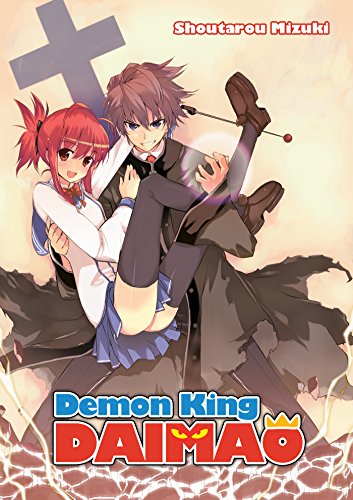By Shoutaro Mizuki and Souichi Itou. Released in Japan as “Ichiban Ushiro no Daimaou” by Hobby Japan. Released in North America digitally by J-Novel Club. Translated by David Musto.
While I would not go so far as to say that it was terrible, or that I won’t get more (I am curious to see what happens next), there’s no getting around the fact that Demon King Daimaou is a deeply flawed book. It knows what it wants to do, but sometimes skips necessary steps to get there. Its setting is bog standard, and most of its characters hew to the cliched stereotype. In fact, when this fairly old light novel series was made into an anime several years back, fans called the heroines by their hair color rather than their name. That’s harder to do with a textual book, even with illustrations, so I will try to use actual names – I apologize if this makes things confusing. The most interesting part of the book is the hero, but that’s not always to its benefit either.
Our hero is Akuto, seen here on the cover showing more expressiveness than he does in the entirety of this book. He’s a young orphan who arrives at Constant Magical Academy in order to start a path towards changing the world by becoming a high priest. Unfortunately, like the Sorting Hat in Harry Potter only much worse, there’s a machine at the school that lays out your perfect career path for all students. And Akuto’s is Demon King, which disturbs almost everyone since the last Demon King was defeated at that very school years ago. Of course, Akuto doesn’t believe in fate, and a simple explanation to his fellow students should do the trick. Unfortunately, while he may be overly serious, studious, and have seemingly noble intentions, he cannot help but stick his foot in his mouth every time he speaks – partly as he genuinely isn’t paying attention to how his words come across till after he’s said them, and partly because, well, he really would make a pretty nifty demon king.
Akuto is interesting as a hero mostly as he’s not really the hot-headed, fiery type or the “harem protagonist” type – the book runs on his total inability to say the right thing in any given situation, but skewed just enough so it doesn’t seem familiar. The same can’t be said of the heroines. Keena, the girl on the cover, is meant to be the ‘airhead’ sort, but also has a mysterious past, and spends a lot of the book away from events. Junko is our standard Akane Tendo heroine, who likes Akuto at first before he’s chosen by the machine to be demon king, but afterwards alternates between humiliated rage at being played for a fool and growing feelings of love (that frankly grow far too fast given their interaction). The best of the girls so far is Korone, an android bodyguard with a stonefaced expression and a tendency to tease the bejabbers out of Akuto – she was my favorite part of the book.
I should also mention the ending, which features another girl, who is secretly evil, getting her comeuppance at the end in what is meant to be a humorous way. Sadly, this involves her getting gangraped by her other female classmates, who are under the influence of a drug. It’s implied and offscreen, but I don’t care. It’s ugly and awful. It helps to make this first volume something of a hot mess, and while I’m not abandoning it just yet, it’s on thin ice. I’d recommend it to those who enjoyed the anime only.

